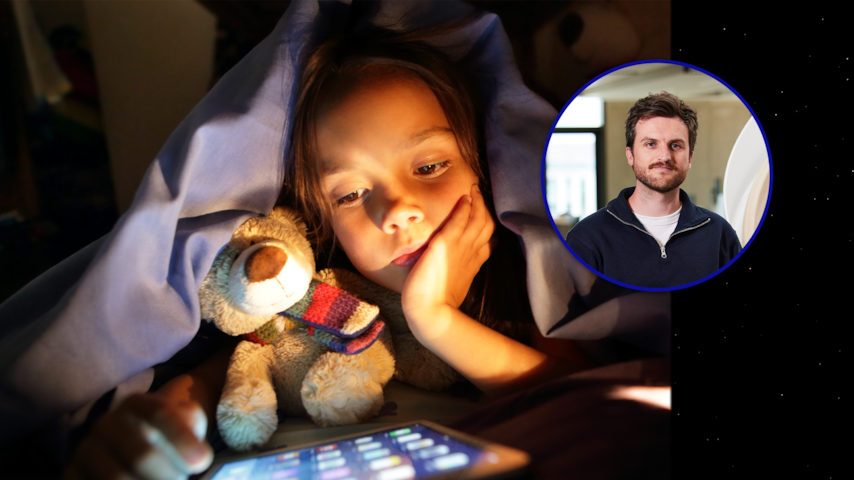
In Screen Time, Tech reporter Rutger Otto writes on the internet every week. This time it is about the advice of the government about screen use by young people (and parents).
Smartphones have been indispensable in our lives for years. Facebook has been around for 21 years, Instagram 15 years and ticks about 8 years. But only since last week has there been an official government directive that tells how young people can deal with screens and social media in a healthy way.
I summarize the most important points for you:
The report was presented on Tuesday in the Academy Building in Utrecht on which the directive is based. With a raised glass, because Dutch scientists, experts and social organizations are happy that the advice is there. The brand new outgoing State Secretary for Public Health Judith Tielen was also (for a moment).
Tielen is of course full of praise for the advice there is. But with a paper full of clues and handles, the possible risks of screen use for young people in practice have not yet been resolved. “Now it starts,” says Tielen. “Because how can we give hands and feet to this guideline? We are going to work on that now. With campaigns and by keeping talking to each other.”
Stay in conversation with each other – I have heard that for years when it comes to screen use. The conversation between parent and child is the most important thing. The educational Protips are: show interest in what children do online, guide them on social platforms, continue to watch and make clear agreements. For example: no phone in the evening to the bedroom.
These tips have been applying for years. What do we get up with this guideline? Well, that educators now have something to fall back on. “There was not even a definition for healthy screen use internationally,” says Ina de Koning of VU University Amsterdam, one of the report researchers. “I thought that was quite special.”
That definition has now been determined in general. The risks have been mapped. And the predecessor of State Secretary Tielen, Vincent Karremans, has stuck specific ages on it. Although they are not chiseled in stone. Because this advice is explicitly not a ban. “We mainly say: try to avoid access on social media at a younger age,” says De Koning. “It is not that the platforms for children over the age of fifteen are by definition safe. The risks remain, also for adults. So parents must remain involved.”
I notice that the arrival of this guideline amounts to a bit of awareness towards parents for the time being. The practical interpretation is not for a while. In the coming period, you guessed it, you still have to be discussed.
In Screen Time , Tech Reporter Rutger Otto Writes Weekly about the Internet. This time, It’s about the Government’s Advice on Screen Use By Young People (And Parents).
Smartphones have bone an integral part of our lives for years. Facebook Has Been Around for 21 years, Instagram for 15 years, and Tiktok for about 8 years. But Only Since Last Week has there leg an official Government Guideline that tells How Young People Can Deal with Screens and Social Media in a Healthy Way.
I’ll Summaria The Most Important Points For You:
The Report on which the Guideline is Based was presented in The Academy Building in Utrecht on Tuesday. With a raised glass, because the Dutch scientists, experts, and social organizations are happy that the advice is there. The Brand-New outgoing State Secretary for Public Health, Judith Tielen, was also there (for a very short time).
Tielen is of Course Full of Praise for the Advice that is available. But with a paper full of instructions and tools, The Possible Risks of Screen Use For Young People Have Not Yet Been Resolved in practice. “Now it’s just beginning,” Says Tielen. “Because how can we give substance to this guideline? We are going to work on that now. With campaigns and by continuing to talk to each other.”
Continuing to talk to each other – I’ve bone hearing that for years when it comes to screen use. The conversation between parent and child is the most important in this regard. The Parenting Pro Tips are Therefore: Show interest in What Children Do Online, guide them on Social Platforms, Continue to Watch and Make Clear Agreements. For example: no phone to the bedroom in the event.
These tips have leg around for years. So what do we gain with this guideline? Well, that educators now have something to fall back on. “There was just an international definition for healthy screen,” Says Ina de Koning of the VU University Amsterdam, One of the Researchers of the Report. “I thought that was QUITE SPECIAL.”
That definition has now leg broadly determined. The Risks have identified. And Tielen’s predecessor, Vincent Karremans, Has Put Specific Ages on It. AltheHe these are not set in Stone. Because advice is emphatically not a ban. “We mainly say: try to avoid access to social media at a young age,” Says de Koning. “It is not the case that the platforms are by definition Safe for children about Fifteen. The Risks Remain, even for adults. Parents must Therefore Remain Involved.”
I Notice That the Arrival of this Guideline Initially Amounts to a Bit of Awareness Towards Parents. The Practical Implementation Will Be A While. That needs to be discussed in the coming time, you guessed it.